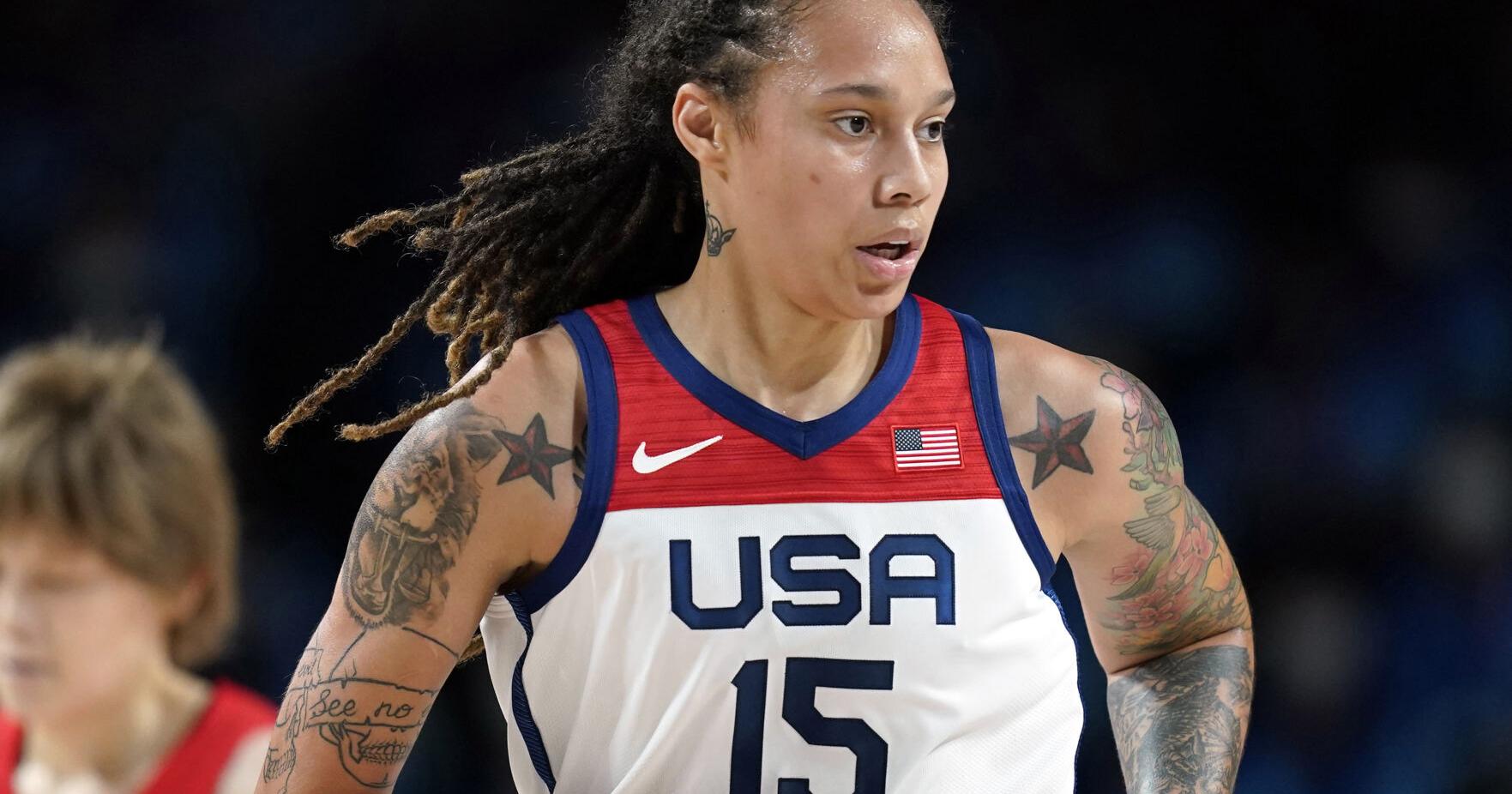
The return of Brittney Griner to the United States in a dramatic prisoner swap with Russia marked the culmination of a 10-month ordeal that captivated world attention, a saga that landed at the intersection of sports, politics, race and gender identity — and wartime diplomacy.
Griner had for years been known to fans of women’s basketball — college player of the year, a two-time Olympic gold medalist and WNBA all-star who dominated her sport. But her arrest on drug-related charges at a Moscow airport in February elevated her profile in ways neither she nor her supporters would have ever hoped for, making her by far the most high-profile American to be jailed abroad.
People are also reading…
Her case not only brought unprecedented public attention to the dozens of Americans wrongfully detained by foreign governments, but it also emerged as a major inflection point in U.S.-Russia diplomacy at a time of deteriorating relations prompted by Moscow’s war against Ukraine.
“I think her celebrity and the coinciding with the time of the invasion of Ukraine, those two points together is what made her case national news, international news, but also I think it made it made it feel much more fraught than a lot of the earlier cases of Americans being detained in Russia,” Kimberly St. Julian-Varnon, a Russian historian and doctoral student at the University of Pennsylvania, said in an interview days before Griner was freed.
After months of strained negotiations, and an extraordinarily rare public revelation by the Biden administration that it had made a “substantial proposal” to get home Griner and another detained American, Paul Whelan, the case resolved last week with a prisoner swap in which the WNBA star was exchanged in the United Arab Emirates for Russian arms dealer Viktor Bout.
The deal drew criticism from some prominent Republicans, who lamented that the U.S. had not gotten Whelan home and who complained that the administration had given up a convicted felon as notorious as Bout. Administration officials, for their part, conceded that such prisoner swaps can carry a heavy price but also said it was unacceptable for Griner to remain locked up and that the deal that they reached was the only one that could secure her release.
“We try to pay, of course, as little a price as possible,” a senior Biden administration official told reporters last week on condition of anonymity under ground rules set by the White House. “But ultimately, we feel there’s a moral obligation, frankly, as well as a policy obligation to bring people who are being held hostage or wrongfully detained home.
For weeks after Griner’s arrest at a Moscow airport in February, where Russian authorities said a search of her luggage revealed vape cartridges containing cannabis oil, her supporters kept a relatively low profile in hopes her case would be quickly resolved. In May, though, the State Department announced she’d been designated as a wrongful detainee, giving the U.S. government’s top hostage negotiator the authority to try to secure her release outside the legal system.
She pleaded guilty over the summer, admitting that she had the canisters in her luggage but that she packed them inadvertently in her haste to make her flight and had no criminal intent. From there, attention turned to the possibility of a prisoner swap, especially after Secretary of State Antony Blinken’s announcement of a “substantial proposal.”
All the while, Griner’s saga sparked discussions about pay equity for WNBA players that leads women to play overseas to supplement their salaries. During her journey, Griner also drew support from her teammates and the league — the WNBA honored her with a floor decal — as the case received more attention and as her imprisonment put pressure on the administration to negotiate her release. Her wife, Cherelle, and her agent met with Biden at the White House as other officials worked behind-the-scenes on the case.
St. Julian-Varnon said Griner’s status as a Black and openly gay woman — two minority identities “at the flashpoints of national politics in the United States right now” — cut both ways, with members of those communities seeing her as a representative. But it’s “also made a lot of people think that she doesn’t matter, that she deserves a nine-year sentence in a Russian penal colony.”
She was greeted last week by the special president envoy for hostage affairs, Roger Carstens, who traveled to bring her back to the U.S. Her first stop was a military base in Texas. Carstens said in an interview with CNN that he offered Griner some space to decompress on the plane but that she said: “I have been in prison for 10 months now, listening to Russian. I want to talk,”
“I was left with the impression this is an intelligent, passionate, compassionate, humble, interesting person, a patriotic person,” Carstens said. “But above all, authentic. I hate the fact that I had to meet her in this manner, but I actually felt blessed having had a chance to get to know her.”
Now that she’s back in the U.S., Griner plans to be out of the public spotlight for awhile spending time with her wife. No longer just a generational women’s basketball player, Griner is standing at a much larger crossroads.
She hasn’t said if she’ll ever play basketball again. She’s under contract with the Phoenix Mercury. She was in Russia to supplement her WNBA income where she earned roughly $230,000 in base salary. She earned five times that while playing overseas in the winter in Russia.
Off the court, the Griners do plan to continue to be advocates for the release of other wrongly detained Americans like Whelan.
“BG and I will remain committed to the work of getting every American home, including Paul, whose family is in our hearts today as we celebrate BG being home,” Cherelle Griner said.
Copyright 2022 The Associated Press. All rights reserved. This material may not be published, broadcast, rewritten or redistributed without permission.
#lee-rev-content { margin:0 -5px; } #lee-rev-content h3 { font-family: inherit!important; font-weight: 700!important; border-left: 8px solid var(–lee-blox-link-color); text-indent: 7px; font-size: 24px!important; line-height: 24px; } #lee-rev-content .rc-provider { font-family: inherit!important; } #lee-rev-content h4 { line-height: 24px!important; font-family: “serif-ds”,Times,”Times New Roman”,serif!important; margin-top: 10px!important; } @media (max-width: 991px) { #lee-rev-content h3 { font-size: 18px!important; line-height: 18px; } } #pu-email-form-breaking-email-article { clear: both; background-color: #fff; color: #222; background-position: bottom; background-repeat: no-repeat; padding: 15px 0 20px; margin-bottom: 40px; border-top: 4px solid rgba(0,0,0,.8); border-bottom: 1px solid rgba(0,0,0,.2); display: none; } #pu-email-form-breaking-email-article, #pu-email-form-breaking-email-article p { font-family: -apple-system, BlinkMacSystemFont, “Segoe UI”, Helvetica, Arial, sans-serif, “Apple Color Emoji”, “Segoe UI Emoji”, “Segoe UI Symbol”; } #pu-email-form-breaking-email-article h2 { font-size: 24px; margin: 15px 0 5px 0; font-family: “serif-ds”, Times, “Times New Roman”, serif; } #pu-email-form-breaking-email-article .lead { margin-bottom: 5px; } #pu-email-form-breaking-email-article .email-desc { font-size: 16px; line-height: 20px; margin-bottom: 5px; opacity: 0.7; } #pu-email-form-breaking-email-article form { padding: 10px 30px 5px 30px; } #pu-email-form-breaking-email-article .disclaimer { opacity: 0.5; margin-bottom: 0; line-height: 100%; } #pu-email-form-breaking-email-article .disclaimer a { color: #222; text-decoration: underline; } #pu-email-form-breaking-email-article .email-hammer { border-bottom: 3px solid #222; opacity: .5; display: inline-block; padding: 0 10px 5px 10px; margin-bottom: -5px; font-size: 16px; } @media (max-width: 991px) { #pu-email-form-breaking-email-article form { padding: 10px 0 5px 0; } }








